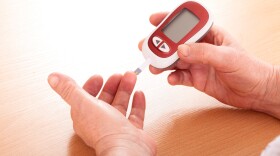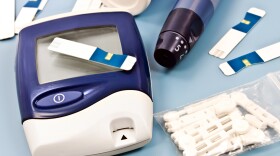"We want to tell you now about a device that's still in the investigational phase, which means it's hasn't yet even been submitted for FDA approval. But when we heard about something called a bionic pancreas, we thought you might be interested, too" says host Barbara Lewis.
Edward Damiano: On the surface of things, it might actually look a little bit more like a smartphone, if you looked at it, except it would have two plastic tubes coming out of it, which would look a little bit strange.
Lewis: Ed Damiano is a biomedical engineer. When his 11-month old son David was diagnosed with Type 1 diabetes, Ed started working on a device to help manage David's blood sugar levels automatically. And before we tell you more about how that bionic pancreas works, just a reminder about how people with diabetes go through a typical day. Dr. Steve Russell is diabetes specialist at Harvard Medical School and Massachusetts General Hospital.
Dr. Russell: When people manage their own diabetes, which is what everyone with Type 1 does, because decisions have to be made many times a day, they check their blood sugars with a finger prick typically and some of them use these continue glucose monitors. They then look at the food they are then about to eat if they're going to eat, and they take all of that information and use some ratios of numbers that their endocrinologists give them, and they calculate an insulin dose and then they program that insulin dose into a pump or they give themselves a shot. And then, a couple hours later, they'll check to see how they are doing and they may make another adjustment, may take another insulin dose. If they're going to get really good control, they're going to do that 10-15 times a day. If they make a mistake, their consequences can be a very high blood sugar that has to be treated with extra insulin, or a very low blood sugar which can be very dangerous. In the early stages it can cause shaking and sweating, and in the later stages it can cause unconsciousness, seizures and even death. So they are constantly walking this line.
- Edward Damiano is a biomedical engineer at Boston University
- Steven Russell is a diabetes specialist at Harvard Medical School and Massachusetts General Hospital
- Overview of the Bionic Pancreas
- The article, "Outpatient Glycemic Control With A Bionic Pancreas in Type 1 Diabetes" was originally published by The New England Journal of Medicine
- Watch the bionic pancreas in action: http://youtu.be/xrXeAylgeTI




